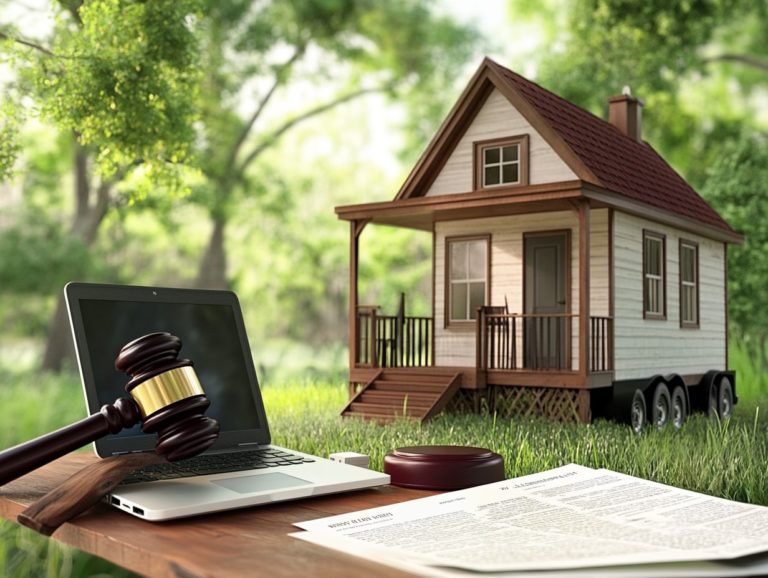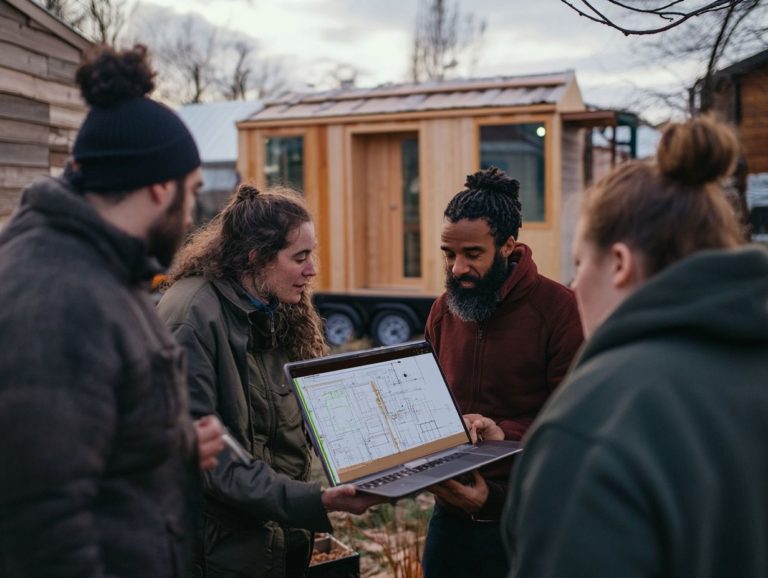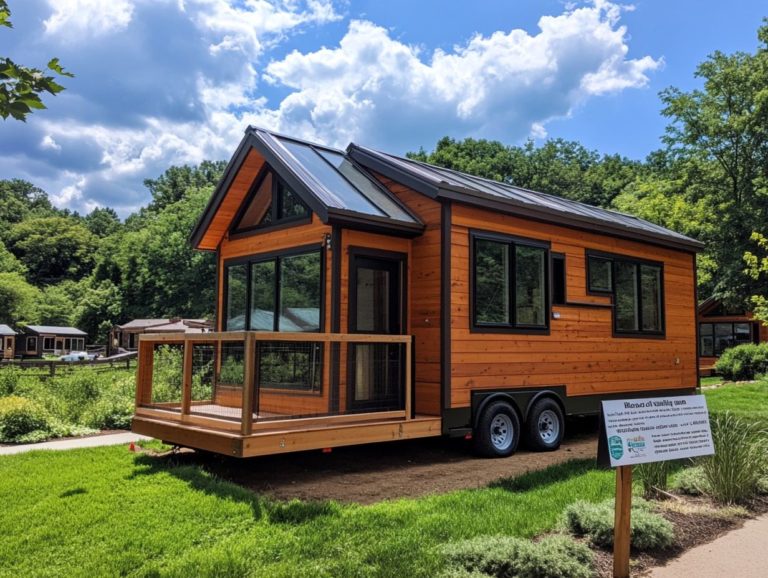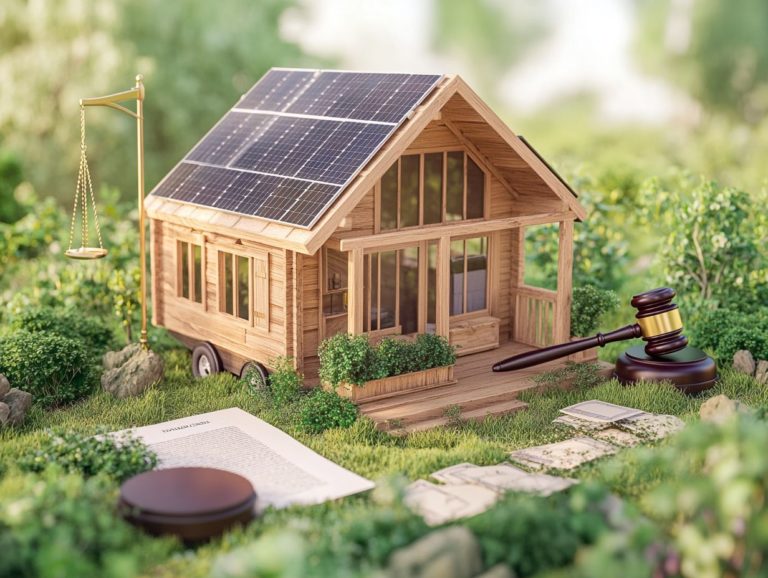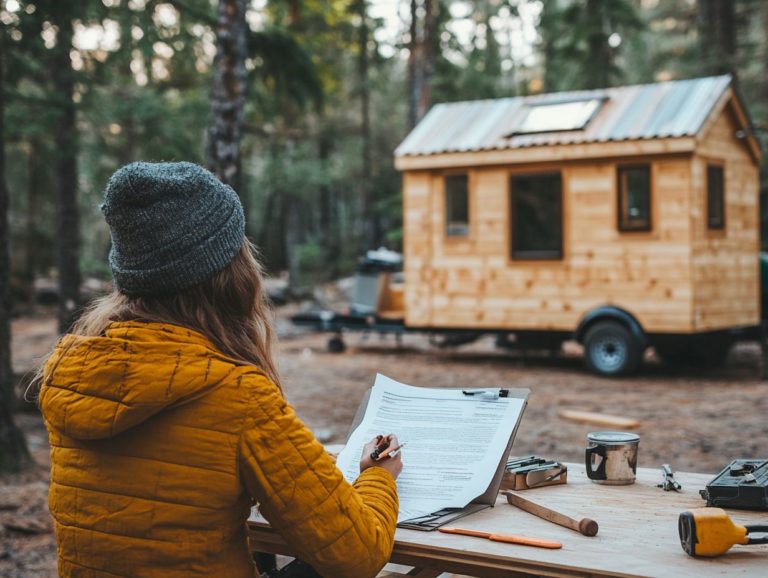Legal Considerations for Tiny House Rentals
Tiny house rentals have skyrocketed in popularity. They offer a unique blend of minimalist living and adventure.
However, understanding the laws governing tiny house rentals can be challenging. From varying regulations and zoning laws to potential landlord-tenant issues, renting out a tiny home presents its own set of complexities.
This article will equip you with everything you need to know. You’ll find essential steps for ensuring compliance, tips for safeguarding your interests, and guidance on crafting clear rental agreements.
Whether you’re a seasoned landlord or simply curious about the tiny house trend, grasping these legal considerations is vital for a successful rental experience.
Contents [hide]
- Key Takeaways:
- Current Legal Landscape
- Potential Legal Issues for Tiny House Rentals
- Steps to Legally Renting Out a Tiny House
- Tips for Protecting Yourself Legally as a Tiny House Landlord
- Understanding Liability and Insurance Coverage
- Frequently Asked Questions
- What are the legal considerations for tiny house rentals?
- What are zoning laws and how do they apply to tiny house rentals?
- Are there any building codes that need to be followed for tiny house rentals?
- Do I need insurance for my tiny house rental?
- What are my liabilities as a tiny house rental owner?
- Are there any specific contracts or agreements that should be used for tiny house rentals?
Key Takeaways:
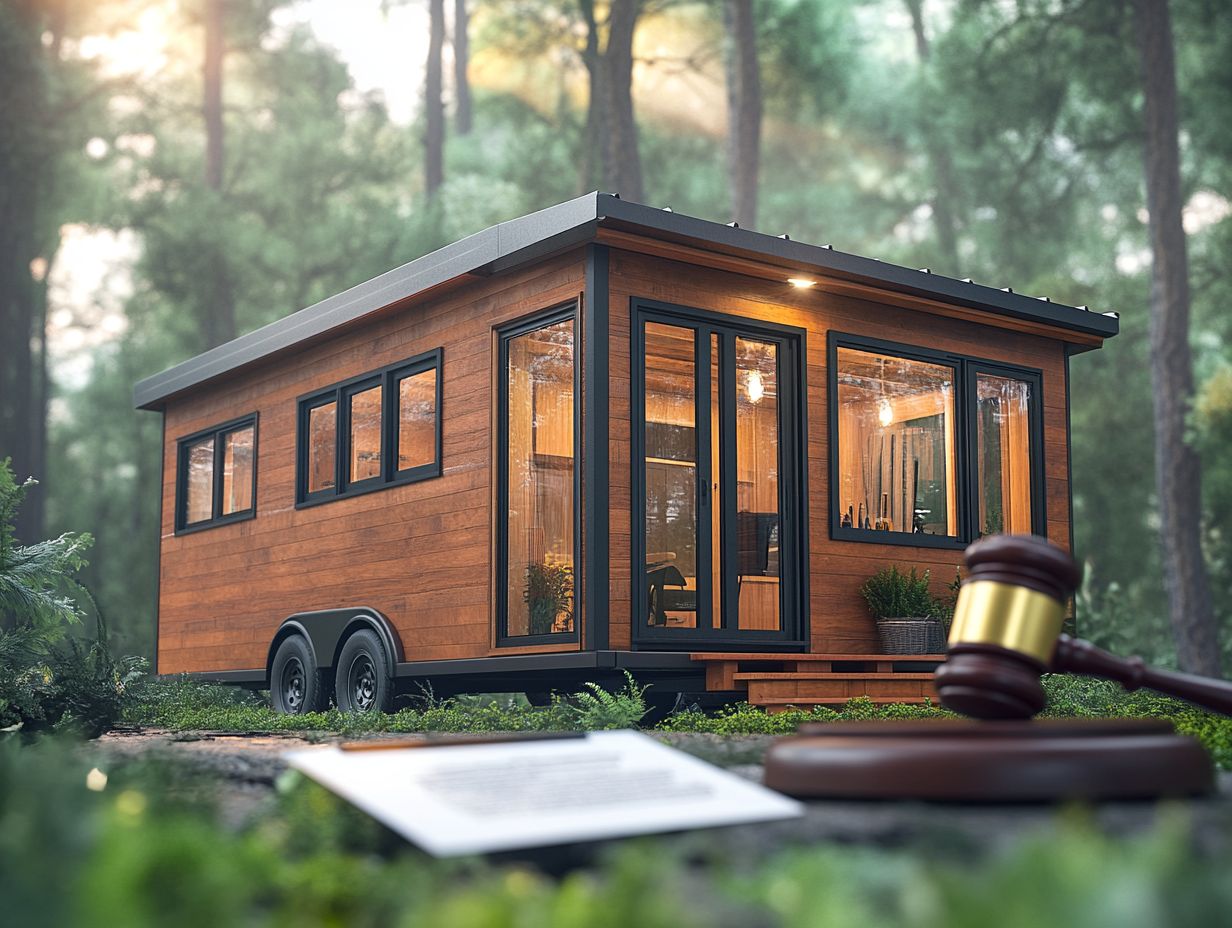
- Understand local regulations before renting your tiny house.
- Get the right permits to avoid legal pitfalls.
- Draft clear rental agreements to protect yourself.
What is a Tiny House Rental?
A tiny house rental provides you with a distinctive lodging experience that embodies eco-friendliness and space efficiency. This reflects the tiny house movement that gained momentum after the 2008 mortgage crisis. These creatively renovated, often mobile homes appeal to those looking to downsize while enjoying vacation rentals in diverse locales, from the sun-soaked shores of California to the vibrant landscapes of Florida.
Travelers are drawn to these rentals because they blend modern aesthetics with a commitment to sustainable living. This makes them increasingly popular for short-term getaways.
Many tiny house rentals feature innovative designs that optimize every square inch. This creates a warm and inviting atmosphere without compromising on comfort. This burgeoning trend speaks to contemporary travel desires focused on minimalism and sustainability, inviting you to forge a deeper connection with nature.
You ll find that guests often value the simplicity and adventurous spirit these tiny homes encourage. They provide a much-needed escape from the hustle and bustle of daily life. By opting for a mobile tiny house, you can embrace your wanderlust while uncovering hidden gems off the beaten path. This further enriches your travel experience.
Current Legal Landscape
The legal landscape surrounding tiny house rentals is intricate and varies considerably from one state to another and among municipalities across the United States. Local regulations and the evolving tiny house industry create a complex legal landscape. Stay informed about these nuances to make the most of your tiny house rental journey!
Organizations like the National Association of Home Builders offer invaluable guidelines for homeowners contemplating the transition of their tiny homes into investment properties. They help you navigate compliance with zoning laws and safety requirements, as well as navigating legal pitfalls associated with tiny house building.
Overview of Regulations and Zoning Laws
Understanding the landscape of regulations and zoning laws is crucial for anyone diving into the tiny house movement. These rules dictate the legality of placing small homes on various properties, including Accessory Dwelling Units (ADUs). Local regulations can vary dramatically between states like California and Florida. This means you ll need to navigate a landscape that could be confusing but is essential for your compliance and success.
In California, for instance, many cities have fully embraced ADUs. This has made it easier for the tiny house trend to flourish through streamlined permits and fewer restrictions. On the flip side, certain areas in Florida have strict zoning laws that can obstruct the placement of tiny structures, especially when considering innovative designs.
These nuances significantly impact tiny house rentals. It’s imperative for aspiring property owners to conduct thorough research, attend local zoning meetings, and possibly consult with legal experts to navigate these regulations effectively, including understanding tiny house financing legal aspects.
Potential Legal Issues for Tiny House Rentals
When you re considering the legal issues related to tiny house rentals, it’s crucial to navigate a web of complexities. These include landlord-tenant laws, liability insurance that covers damages or injuries, and the tax implications of renting out properties.
Understanding these legal frameworks is vital for both newcomers and seasoned homeowners looking to succeed in the tiny house industry while protecting their investments. For more information, check out understanding the legal status of tiny houses.
Landlord-Tenant Laws and Liability
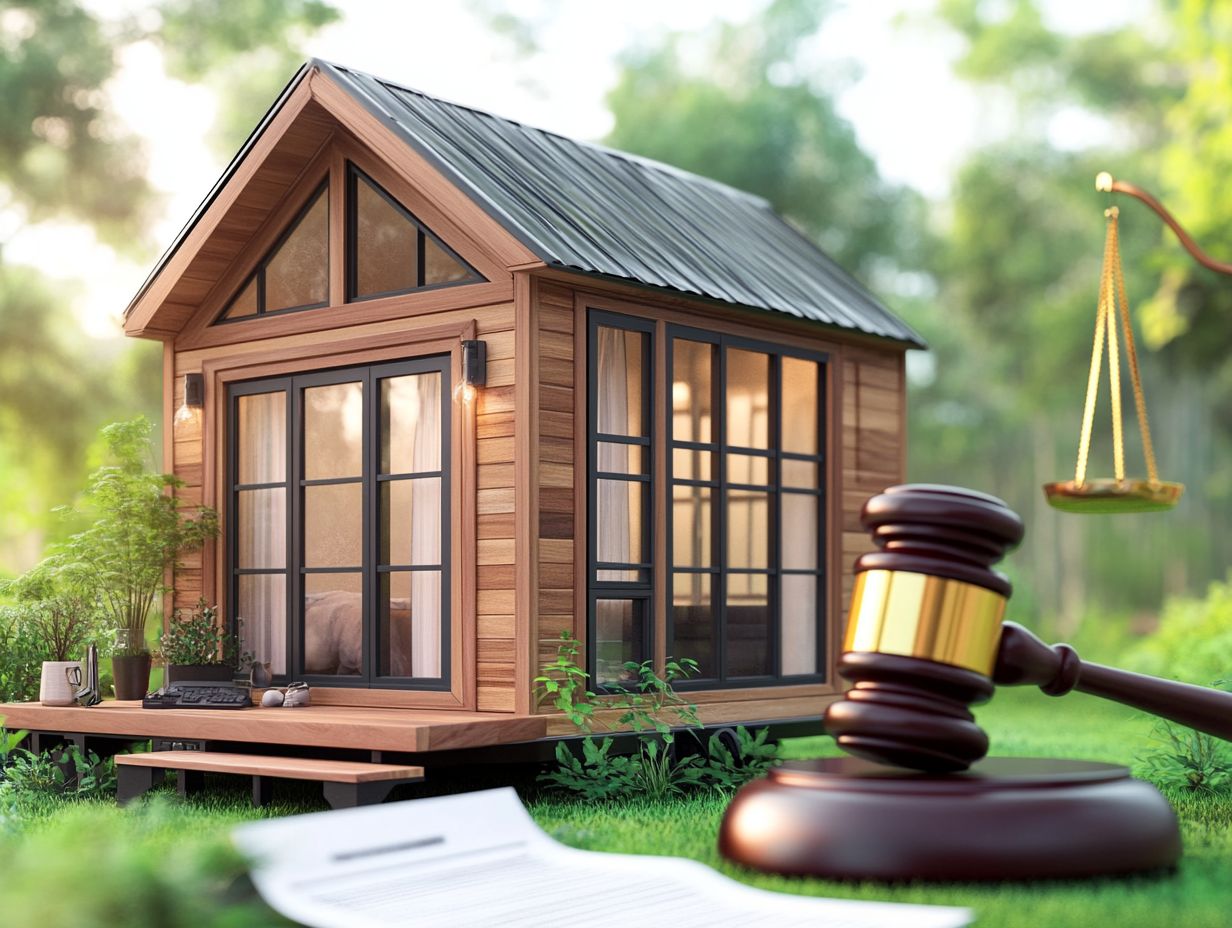
Landlord-tenant laws define the complex relationships between landlords and renters in tiny house rentals. These laws establish the rights, responsibilities, and potential liabilities that both parties must navigate to minimize risks and create a positive experience.
For landlords, investing in liability insurance and fostering a feedback loop with tenants is essential. This approach not only ensures a smooth rental experience but also assists in complying with local laws and regulations.
Understanding these regulations may seem overwhelming, but they are key to nurturing positive interactions that can lead to successful tiny house rentals. For instance, clear communication about maintenance responsibilities, safety protocols, and property usage can reduce misunderstandings and enhance tenant satisfaction. Familiarizing yourself with understanding tiny house land use laws is essential in this process.
Liability insurance serves a dual purpose: it protects landlords from unexpected incidents while giving renters peace of mind about their living arrangements.
Building trust through transparent agreements that align with local landlord-tenant laws benefits both parties and contributes to a healthier, more sustainable tiny house rental market.
Tax Implications
The tax implications for tiny house rentals can be intricate, especially when classifying them as short-term rentals or investment properties. Different states, such as Georgia and Colorado, have unique tax regulations and requirements. Understanding these financial responsibilities is crucial for landlords to ensure compliance while maximizing investment returns.
Many municipalities have their own rules regarding occupancy taxes and licensing requirements, which can vary significantly. For example, a tiny house rental in California may face stricter regulations and higher tax rates compared to one in Texas, where the legal implications of tiny house ownership might be more lenient.
Grasping these nuances is essential for landlords, as failing to follow local laws could lead to hefty fines and penalties. Keeping detailed financial records is a smart move that pays off! It’s also beneficial to consult with tax professionals who understand local regulations. This will help you effectively navigate the complexities of filing taxes on rental income while ensuring compliance.
By taking these steps, you can make informed decisions that not only protect your investment but also promote sustainable growth.
Steps to Legally Renting Out a Tiny House
To legally rent out a tiny house, you must follow a series of important steps. This includes obtaining the necessary permits and licenses while ensuring compliance with building codes and safety regulations.
Familiarity with these processes shields you from potential legal complications and fosters trust with travelers seeking unique vacation rentals.
Obtaining Necessary Permits and Licenses
Obtaining the necessary permits and licenses is a crucial first step for homeowners keen on diving into the tiny house industry. Local regulations dictate what s required in each area for tiny house rentals. This process can differ dramatically from state to state. For instance, Alabama may have different requirements compared to others, making it essential for you to conduct thorough research to ensure compliance.
Start by visiting your local government’s website to gather information on zoning laws, building codes, and business licensing. Connecting with local tiny house communities or forums can also be incredibly beneficial. Seasoned members often share invaluable insights on what to know about tiny house land leases and how to navigate these regulations.
In certain areas, you may find that special permits for short-term rentals are necessary. Others might impose restrictions on the size or location of your tiny house. Understanding the legal risks of building a tiny house not only streamlines your application process but also helps you avoid costly fines and legal headaches in the future.
Complying with Building Codes and Safety Regulations
Complying with building codes and safety regulations is essential when operating a mobile tiny house rental, especially if it incorporates eco-friendly elements like solar panels. This means your tiny house will be safe and efficient, making it a great choice for guests. By understanding these guidelines, you protect your investment and elevate the experience for travelers seeking unique accommodations.
When you follow local building codes, you ensure that your rentals meet crucial safety standards, including structural integrity, fire safety measures, and plumbing requirements. Implementing eco-friendly practices like using sustainable materials and energy-efficient appliances aligns perfectly with the growing demand for environmentally conscious travel options.
It’s also vital to stay informed about zoning laws and permits specific to your area, as these can directly impact the legality of your rental. Understanding the legalities of moving a tiny house is crucial in this regard. Incorporating safety features such as smoke detectors and carbon monoxide alarms enhances guest security and transforms tiny home vacations into memorable, responsible experiences.
Tips for Protecting Yourself Legally as a Tiny House Landlord
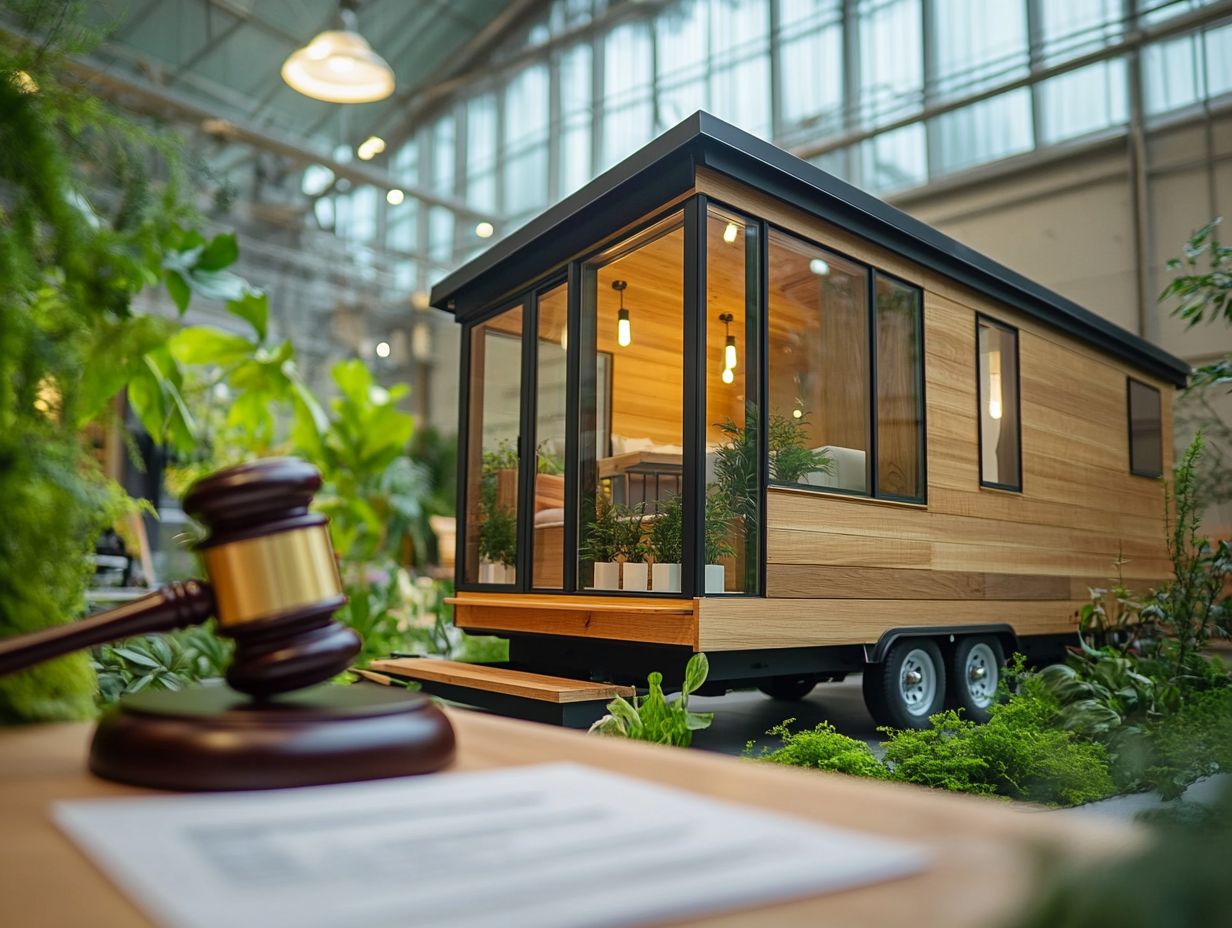
As a tiny house landlord, it’s essential to protect yourself legally through several key strategies. Start by drafting clear rental agreements that outline the terms and expectations. This ensures all parties are on the same page.
Securing adequate liability insurance is vital. This insurance helps cover costs if someone is injured on your property and minimizes potential risks. Conducting a competitive analysis of similar rentals can also offer valuable insights into industry standards, helping you establish effective practices to safeguard your property and enhance your overall success. Additionally, understanding tiny house land ownership: legal considerations is crucial for ensuring compliance and protecting your investment.
Drafting Clear Rental Agreements
Drafting clear rental agreements is crucial for you as a tiny house landlord. It establishes legal protection and sets clear expectations regarding tenant responsibilities and property use. A well-structured agreement is your best ally in preventing misunderstandings and laying a solid foundation for a positive landlord-tenant relationship.
Your agreements should encompass essential elements such as the rental duration, payment terms, and rules regarding property maintenance and alterations. By outlining specific guidelines, you can mitigate risks like property damage or rent disputes.
Clarity on policies concerning pets, utilities, and cleaning expectations fosters mutual understanding and significantly reduces the potential for conflicts. Ultimately, comprehensive rental agreements are more than mere formalities; they are vital documents that protect both your interests and those of your tenants, paving the way for a seamless rental experience.
Understanding Liability and Insurance Coverage
Liability and insurance coverage are crucial for tiny house landlords. They directly influence your legal protection and financial security when renting out your properties.
A good insurance policy provides protection against legal claims and unexpected damages, giving you peace of mind as you navigate the rental landscape.
This is especially important due to the unique nature of tiny house rentals, where space constraints can create specific liability scenarios. Standard homeowner’s insurance may not cover rental activities, making it essential to secure specific landlord insurance. Additionally, exploring tiny house legal resources you should know can provide valuable guidance.
This specialized coverage typically includes liability protection against accidents that may occur on your property, such as injuries to tenants or their guests. It often covers property damage caused by tenants, natural disasters, or other unexpected events.
By investing in the right insurance, you not only protect your financial interests but also foster a trustworthy relationship with your renters, knowing that you re shielded from various risks.
Frequently Asked Questions
What are the legal considerations for tiny house rentals?
When renting out a tiny house, keep in mind several important legal considerations, including zoning laws, building codes, insurance, and liability. Research and understand these regulations to ensure your rental is compliant and to protect yourself from legal issues.
What are zoning laws and how do they apply to tiny house rentals?
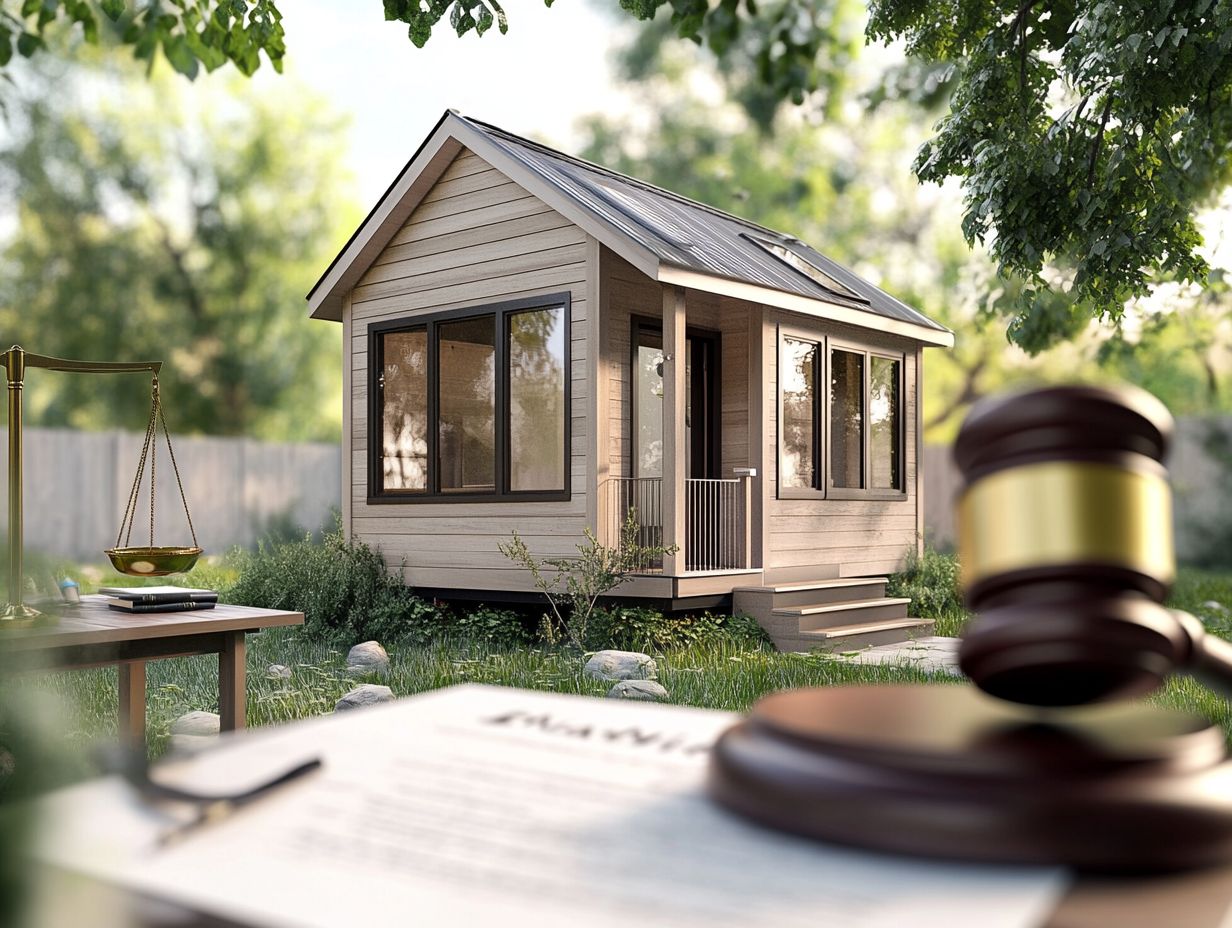
Zoning laws dictate how land can be used and what structures are allowed in certain areas. Some areas may not permit tiny houses as permanent residences, while others may have specific regulations for short-term rentals. Make sure you check with your local government to confirm that your tiny house rental is allowed in the designated area.
Are there any building codes that need to be followed for tiny house rentals?
Yes, there are building codes that must be followed when constructing a tiny house, just like any other dwelling. These codes vary by location but typically cover safety and structural requirements. Ensure your tiny house is built in compliance with these codes to protect your guests’ safety and avoid legal issues.
Do I need insurance for my tiny house rental?
It’s highly recommended to have insurance for your tiny house rental. This protects you financially in case of accidents or damages that may occur on the property. Consult with your insurance provider to ensure you have the appropriate coverage for your rental.
What are my liabilities as a tiny house rental owner?
As a rental owner, you are responsible for providing a safe and habitable living space for your guests. This includes properly maintaining the property, addressing safety hazards, and following all legal regulations. Understanding and taking on these liabilities is essential to protect yourself and your guests.
Are there any specific contracts or agreements that should be used for tiny house rentals?
It’s always wise to have a written contract or rental agreement for your tiny house rental. This document should outline the rental terms, including the length of stay, payment details, and any rules or regulations for the property. Ensure this agreement is signed by both parties to avoid disputes or misunderstandings.

